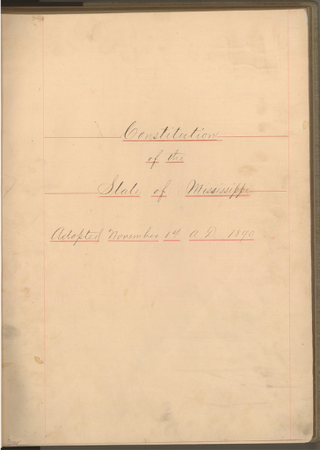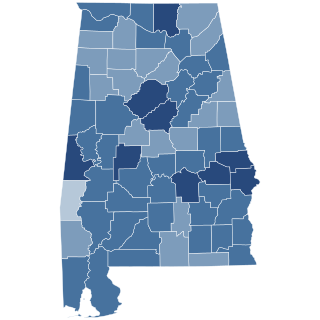
The Thirteenth Amendment to the United States Constitution abolished slavery and involuntary servitude, except as punishment for a crime. The amendment was passed by the Senate on April 8, 1864, by the House of Representatives on January 31, 1865, and ratified by the required 27 of the then 36 states on December 6, 1865, and proclaimed on December 18. It was the first of the three Reconstruction Amendments adopted following the American Civil War.

Involuntary servitude or involuntary slavery is a legal and constitutional term for a person laboring against that person's will to benefit another, under some form of coercion, to which it may constitute slavery. While laboring to benefit another occurs also in the condition of slavery, involuntary servitude does not necessarily connote the complete lack of freedom experienced in chattel slavery; involuntary servitude may also refer to other forms of unfree labor. Involuntary servitude is not dependent upon compensation or its amount. Prison labor is often referred to as involuntary servitude. Prisoners are forced to work for free or for very little money while they carry out their time in the system.

The Civil Rights Act of 1866 was the first United States federal law to define citizenship and affirm that all citizens are equally protected by the law. It was mainly intended, in the wake of the American Civil War, to protect the civil rights of persons of African descent born in or brought to the United States.

The Constitution of the State of Tennessee defines the form, structure, activities, character, and fundamental rules of the U.S. State of Tennessee.
The Maryland Constitution of 1864 was the third of the four constitutions which have governed the U.S. state of Maryland. A controversial product of the Civil War and in effect only until 1867, when the state's present constitution was adopted, the 1864 document was short-lived.

Lyman Trumbull was an American lawyer, judge, and politician who represented the state of Illinois in the United States Senate from 1855 to 1873. Trumbull was a leading abolitionist attorney and key political ally to Abraham Lincoln and authored several landmark pieces of reform as chair of the Judiciary Committee during the American Civil War and Reconstruction era, including the Confiscation Acts, which created the legal basis for the Emancipation Proclamation; the Thirteenth Amendment to the United States Constitution, which abolished chattel slavery; and the Civil Rights Act of 1866, which led to the Fourteenth Amendment to the United States Constitution.

The Constitution of Mississippi is the primary organizing law for the U.S. state of Mississippi delineating the duties, powers, structures, and functions of the state government. Mississippi's original constitution was adopted at a constitutional convention held at Washington, Mississippi in advance of the western portion of the territory's admission to the Union in 1817. The current state constitution was adopted in 1890 following the reconstruction period. It has been amended and updated 100 times in since its adoption in 1890, with some sections being changed or repealed altogether. The most recent modification to the constitution occurred in November 2020, when Section 140 was amended, and Sections 141-143 were repealed.

Penal labour is a term for various kinds of forced labour that prisoners are required to perform, typically manual labour. The work may be light or hard, depending on the context. Forms of sentence involving penal labour have included involuntary servitude, penal servitude, and imprisonment with hard labour. The term may refer to several related scenarios: labour as a form of punishment, the prison system used as a means to secure labour, and labour as providing occupation for convicts. These scenarios can be applied to those imprisoned for political, religious, war, or other reasons as well as to criminal convicts.

The Constitution of the State of Michigan is the governing document of the U.S. state of Michigan. It describes the structure and function of the state's government.
The Constitution of the State of Utah defines the basic form and operation of state government in Utah.

The Reconstruction Amendments, or the Civil War Amendments, are the Thirteenth, Fourteenth, and Fifteenth amendments to the United States Constitution, adopted between 1865 and 1870. The amendments were a part of the implementation of the Reconstruction of the American South which occurred after the Civil War.

The Constitution of Indiana is the highest body of state law in the U.S. state of Indiana. It establishes the structure and function of the state and is based on the principles of federalism and Jacksonian democracy. Indiana's constitution is subordinate only to the U.S. Constitution and federal law. Prior to the enactment of Indiana's first state constitution and achievement of statehood in 1816, the Indiana Territory was governed by territorial law. The state's first constitution was created in 1816, after the U.S. Congress had agreed to grant statehood to the former Indiana Territory. The present-day document, which went into effect on November 1, 1851, is the state's second constitution. It supersedes Indiana's 1816 constitution and has had numerous amendments since its initial adoption.
Brian Kelsey is an American politician and former member of the Tennessee State Senate. A member of the Republican party, he was elected to represent District 31, which encompassed the following parts of Shelby County: Cordova, East Memphis, and Germantown.

Tilikum v. Sea World was a legal case heard in the US Federal Court in 2012 concerning the constitutional standing of an orca. It was brought by People for the Ethical Treatment of Animals (PETA) on behalf of Tilikum, an orca kept in the SeaWorld Orlando park, against the SeaWorld corporation.
The Oregon black exclusion laws were attempts to prevent black people from settling within the borders of the settlement and eventual U.S. state of Oregon. The first such law took effect in 1844, when the Provisional Government of Oregon voted to exclude black settlers from Oregon's borders. The law authorized a punishment for any black settler remaining in the territory to be whipped with "not less than twenty nor more than thirty-nine stripes" for every six months they remained. Additional laws aimed at African Americans entering Oregon were ratified in 1849 and 1857. The last of these laws was repealed in 1926. The laws, born of pro-slavery and anti-black beliefs, were often justified as a reaction to fears of black people instigating Native American uprisings.

Colorado Amendment A was a 2018 referendum to amend Article II, Section 26 of the Constitution of Colorado to remove language permitting slavery and involuntary servitude only as punishment for crime.

In the United States, the 13th Amendment to the United States Constitution prohibits slavery and involuntary servitude, except as a punishment for a crime of which one has been convicted. In the latter 2010s, a movement has emerged to repeal the exception clause from both the federal and state constitutions.

Oregon Ballot Measure 112, the Remove Slavery as Punishment for Crime from Constitution Amendment, is an amendment to the Constitution of Oregon passed as part of the 2022 Oregon elections. The measure removes the loophole where slavery and involuntary servitude are legal within the state as punishment for a crime. It added language that authorizes an Oregon court or probation or parole agency to order a person convicted of a crime to engage in education, counseling, treatment, community service, or other alternatives to incarceration, as part of sentencing for the crime.

Tennessee state elections in 2022 were held on Tuesday, November 8, 2022. Primary elections for the United States House of Representatives, governorship, Tennessee Senate, and Tennessee House of Representatives, as well as various judicial retention elections, including elections for all five Tennessee Supreme Court justices as well as general local elections, were held on August 4, 2022. There were also four constitutional amendments to the Constitution of Tennessee on the November 8 ballot.

Alabama Recompiled Constitution Ratification Question was held to amend the Constitution of Alabama, replacing it with a more modern version drafted to achieve the following:














